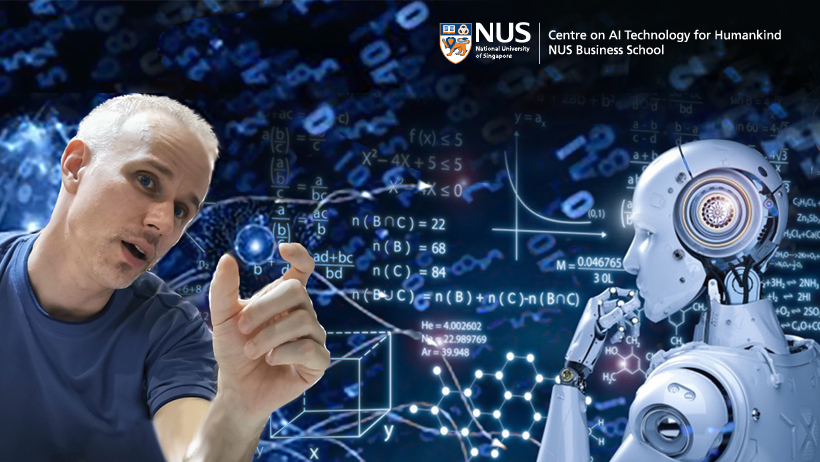NUS Business launches new Centre to promote human-centred mindset in AI use
The National University of Singapore (NUS) Business School today announced the launch of a new research centre – the Centre on AI Technology for Humankind (AiTH, pronounced as “8th”). AiTH aims to promote a human-centred mindset in the use of artificial intelligence (AI) technology by conducting research in the areas of leadership and authority, augmentation of human capital, as well as trust and ethics.
Founded and headed by Professor David De Cremer, Provost’s Chair in the Department of Management and Organisation at NUS Business School, AiTH will bring researchers, thought- and business leaders together to nurture an intellectual and value-driven ecosystem to ensure new AI technologies that will improve the human condition.
“AI is touted as the new hero of society that may match or even surpass human intelligence in future. However, we should examine AI development in the context of co-creation with humans. We hope to develop insights that will inform policymakers, the industry and the public on how AI technologies can be advanced while still maintaining a focus on humans,” said AiTH’s Founder and Director Prof De Cremer, who was recently named one of the world’s top 30 management gurus and speakers by research organisation Global Gurus.
Distinguished Professor Andrew Rose, Dean of NUS Business School, said, “AI has already made a considerable impact on business and society, and will continue to do so in the future. Through AiTH, NUS Business School hopes to contribute insights that will shape a better future. We look forward to seeing AiTH’s research help businesses, policymakers and society make better decisions integrating AI into our lives.”
AiTH has outlined three research themes: leadership and authority; augmentation of human capital; trust and ethics. The research projects will seek to answer questions such as how AI-empowered business models should be employed in trustworthy and ethical ways; how AI can be used to enhance human well-being; and what the enhanced relationship between man and machine means for the future of work specifically, and the development of future society more generally.
AiTH and MIT Technology Review Insights’ Asia’s AI Agenda report
In conjunction with its launch today, AiTH has released the Asia’s AI Agenda report, a research project which it collaborated with MIT Technology Review Insights.
In this survey, which was conducted with more than 1,000 senior executives from a wide variety of businesses in Asia and around the world, researchers examined companies’ technological savviness, their use and challenges with AI in business today, as well as foreseeable challenges with AI in the next three years.
The results showed that the Asia-Pacific region is an early adopter of AI and continues to lead the pack, with 96 per cent of Asian respondents deploying AI in 2019, higher than the 85 per cent average of respondents from the other regions.
In Asia Pacific, the biggest growth of use of AI in business processes will be in sales and marketing (36 per cent in 2019 and 61 per cent in 2022). The Asia-Pacific region will lead this growth because of its e-commerce experience (64.3 per cent of global e-commerce spending in 2019) and its focus on innovation and customer processes.
Another key finding is that in both the Asia-Pacific region and the rest of the world, making and developing an adequate business case for AI employment and the management of data are significant challenges. Compared to the rest of the world, however, the Asia-Pacific region is less concerned about managing digital changes in the workplace because of its experience with AI implementation generally.
The report concluded that the need for regulatory clarity is echoed around the world, but especially so in the Asia-Pacific region where organisations are less willing to share data with third parties, and trustworthiness of data management needs to be addressed.
More details of the report can be found at the following link.
AiTH’s network of academic and industrial partners
The establishment of AiTH was made possible because of a generous contribution from Cornerstone International Education Group, which has strong expertise in AI and education. AiTH is also collaborating with several academic institutions and industry partners to develop insights that may help shape future practices and policies.
One of the academic partners is Imperial College Business School. Professor Francisco Veloso, Dean of Imperial College Business School, who is also a member of AiTH’s advisory council, said, “Imperial College of Business considers the digital nature of business a priority in educating our future leaders, but at the same time we also want to emphasise the need for our new digital leaders to consider the impact that the use of new technologies will bring on humanity. From this point of view, we applaud the launch of the Centre on AI Technology for Humankind at NUS Business School and we look forward to collaborating.”
Professor Tom Tyler, Director of Justice Collaboratory at Yale Law School, said, “Human interaction around the world is rapidly moving towards communication through digital means with the aid of new technologies. These changes raise fundamental questions about how to define and enact justice in this emerging online world. The Social Media Governance Initiative of the Justice Collaboratory at Yale Law School is pleased to have the opportunity to collaborate with the Centre on AI Technology for Humankind at the NUS Business School to help develop the skills and provide the training needed to meet these emerging societal needs.”
Technology giant, Microsoft, is also on board as an industry partner. Alexandros Papaspyridis, Director of Higher Education at Microsoft, Asia-Pacific Japan, said, “Microsoft recognises the transformational impact of AI across all sectors and at the same time, it is important that we consider how AI is applied in a responsible way. We are excited about the launch of the Centre on AI Technology for Humankind at NUS Business School and we look forward to engaging with it so AI can benefit every individual and organisation.”

